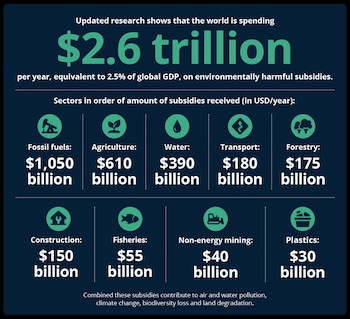This post was originally published on Eco Watch
A new report by Earth Track has found that the world is spending a minimum of $2.6 trillion annually on subsidies that destroy the environment and fuel global heating.
One of the biggest achievements of the 2022 COP15 Convention on Biodiversity was the passage of the Kunming-Montreal Global Biodiversity Framework (GBF), which has a target of protecting and restoring nature by 2030. Target 18 of the GBF included the first quantitative goal for the reduction of environmentally harmful subsidies (EHS), a news release from Earth Track said. The target committed to reducing EHS by $500 billion each year by the end of the decade.
An initial review of the state of EHS in 2022 included looking at a variety of economic sectors that impact land-use changes and the extraction of resources, since it is the combined effect of subsidies that drives nature and biodiversity loss.
Earth Track found that governments are continuing to provide billions in subsidies, tax breaks and other fundings that frustrate the goals of the GBF and the 2015 Paris Climate Accord, reported The Guardian. The report uncovered channels of direct financial support being provided by nations for deforestation, fossil fuel consumption and water pollution.
Earth Track
“Environmentally harmful subsidies are subsidies that governments give in many different forms – not just cash – that have the result of accelerating natural resource extraction, damage to natural habitats and pollution,” said co-author of the report Doug Koplow, who is also founder of Earth Track. Author Ronald Steenblik co-authored the report.
Earth Track said the scale of the subsidies is continuing to rise, even with the GBF and increased focus on EHS.
“Our current estimate is at least $2.6 trillion a year, equivalent to 2.5% of global GDP. These subsidies harm nature and associated biodiversity, and slow global efforts to transition to lower-impact production methods and energy systems,” Earth Track said. “We continue to view our estimate as a floor value for EHS because we know there are so many large data gaps. Closing the largest of these should be a priority for signatories working on Target 18 compliance.”

The new EHS estimate by Earth Track is roughly $800 billion higher than in 2022 — $500 billion after adjusting for inflation. The organization said the increase was due to improved data estimates for rising fossil fuel subsidies, non-energy mining, plastics production and inflation, with fossil fuel subsidies being the biggest driver.
Fossil fuel subsidies “surged to more than $1.5 trillion by the end of 2022 as the Russian invasion of Ukraine led governments around the world to attempt to buffer consumers from price increases,” Earth Track said. “Further, subsidies to carbon capture are growing rapidly in many countries, and are particularly generous in the United States. Much of this will support core fossil fuel industries, including through enhanced oil recovery, and the economic incentives to keep older high-carbon infrastructure in service longer and operating at higher capacity factors.”
Christiana Figueres, former executive secretary of the United Nations Framework Convention on Climate Change, said governments need to provide clearer environmental policies, The Guardian reported.
“Two years on from the signing of the landmark biodiversity plan, we continue to finance our own extinction, putting people and our resilience at huge risk. Estimates are higher than previously thought – with at least $2.6tn now funding the destruction of nature, endangering the chances of meeting our nature and climate goals,” Figueres said.
The authors of the report said a large portion of the $2.6 trillion in subsidies could be redirected toward policies benefiting nature and humans.
With countries meeting next month in Colombia for COP16, Koplow and Steenblik urged governments to keep their commitment to the GBF.
“The issue with a lot of these subsidies is that they’re very poorly targeted,” Steenblik said, as reported by The Guardian. “We’ve seen places like Nigeria where they’ve tried to reform subsidies, [and] there’s a huge backlash because the general public sees it as the only benefit they’re getting out of the government. They [were] spending more on fuel subsidies than education or health.”

The post $2.6 Trillion Spent Annually on Global Subsidies That Harm the Environment, Report Finds appeared first on EcoWatch.





0 Comments